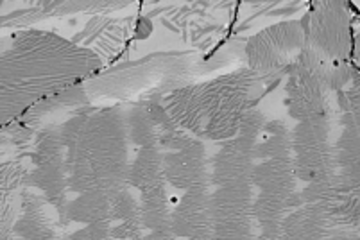All genres
21.
Journal Article
Ab initio study of point defects in NiTi-based alloys. Physical Review B 89 (1), 014110 (2014)
22.
Journal Article
Ab initio based study of finite-temperature structural, elastic and thermodynamic properties of FeTi. Intermetallics 45, pp. 11 - 17 (2014)
23.
Journal Article
Ab initio study of thermodynamic, electronic, magnetic, structural, and elastic properties of Ni4N allotropes. Physical Review B 88 (17), 174103 (2013)
24.
Journal Article
Basal and non-basal dislocation slip in Mg–Y. Materials Science and Engineering A: Structural Materials Properties Microstructure and Processing 576, pp. 61 - 68 (2013)
25.
Journal Article
Ab initio and atomistic study of generalized stacking fault energies in Mg and Mg–Y alloys. New Journal of Physics 15 (4), pp. 043020-1 - 043020-19 (2013)
26.
Journal Article
Ab initio study of single-crystalline and polycrystalline elastic properties of Mg-substituted calcite crystals. Journal of the Mechanical Behavior of Biomedical Materials 20, pp. 296 - 304 (2013)
27.
Journal Article
Self-consistent scale-bridging approach to compute the elasticity of multi-phase polycrystalline materials. Materials Research Society Symposia Proceedings 1524, pp. 17 - 23 (2013)
28.
Journal Article
Ab initio based conformational study of the crystalline alpha-chitin. Biopolymers 99, pp. 22 - 34 (2013)
29.
Journal Article
Ab initio identified design principles of solid-solution strengthening in Al. Science and Technology of Advanced Materials 14 (2), 025001 (2013)
30.
Journal Article
Theory-Guided Materials Design of Multi-Phase Ti–Nb Alloys with Bone-Matching Elastic Properties. Materials 5 (10), pp. 1853 - 1872 (2012)
31.
Journal Article
The relation between ductility and stacking fault energies in Mg and Mg–Y alloys. Acta Materialia 60 (6-7), pp. 3011 - 3021 (2012)
32.
Journal Article
Trends in the elastic response of binary early transition metal nitrides. Physical Review B 85, pp. 064101-1 - 064101-9 (2012)
33.
Journal Article
First-principles study of the thermodynamic and elastic properties of eutectic Fe–Ti alloy. Acta Materialia 60 (4), pp. 1594 - 1602 (2012)
34.
Journal Article
Ab initio study of pressure stabilized NiTi allotropes: Pressure-induced transformations and hysteresis loops. Physical Review B 84, pp. 224119-1 - 224119-8 (2011)
35.
Journal Article
Methodological challenges in combining quantum-mechanical and continuum approaches for materials science applications. European Physics Journal Plus 126, pp. 101-1 - 101-22 (2011)
36.
Journal Article
Ab initio study of energetics and magnetism of Fe, Co, and Ni along the trigonal deformation path. Physical Review B 83, pp. 184424-1 - 184424-7 (2011)
37.
Journal Article
Determining the elasticity of materials employing quantum mechanical approaches: From the electronic ground state to the limits of materials stability. Steel Research International 82 (2), pp. 86 - 100 (2011)
38.
Journal Article
Robustness and optimal use of design principles of arthropod exoskeletons studied by ab initio-based multiscale simulations. Journal of the Mechanical Behavior of Biomedical Materials 4, pp. 129 - 145 (2011)
39.
Journal Article
Anisotropic mechanical behavior of ultrafine eutectic TiFe cast under non-equilibrium conditions. Intermetallics 19, pp. 327 - 335 (2011)
40.
Journal Article
Using ab initio calculations in designing bcc MgLi–X alloys for ultra-lightweight applications. Advanced Engineering Materials 12 (12), pp. 1198 - 1205 (2010)











